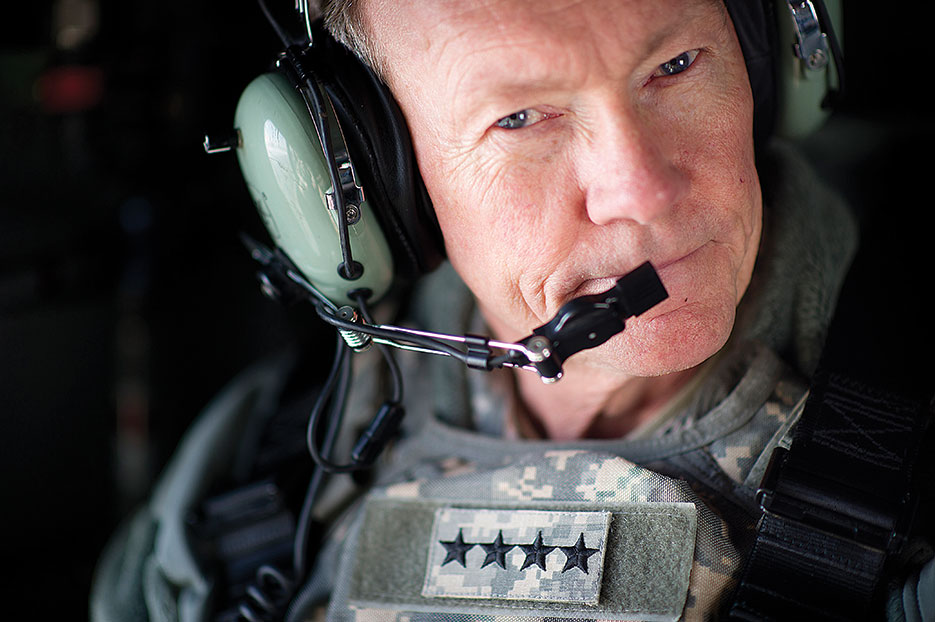Every so often we find ourselves in a place where we can take time to assess where we are, where we have been, and where we think we are going—and check it against where we think we should be ending up. This edition of JFQ offers two interviews that are assessments of events past, present, and future. Both are of stories not yet complete: one, the wars in Afghanistan and Iraq; the other, the production of the F-35 fighter aircraft. The first of these interviews is with the 18th Chairman of the Joint Chiefs of Staff General Martin Dempsey on his views about the wars in Iraq and Afghanistan, the decisions that were made that shaped these wars, and their outcomes. General Dempsey provides a candid assessment of what he experienced both “in country” as well as his interaction with his superiors at different times over the past decade and more. He also offers some important insights about civilian-military relationships that he knows from firsthand experience. Consider this a must-read for those who may find themselves in this “arena” at the top of the executive branch. The second interview is with Lieutenant General Christopher Bogdan, USAF, who is the Program Executive Officer for the F-35. Lieutenant General Bogdan provides his views on where the F-35 is headed while addressing the “stories of the past.” Both interviews will in many ways surprise you as well as let you hear from the officers who are best positioned to see the time horizon of a nation’s wars and the place for the machines we build to fight them.

General Dempsey on UH-60 Blackhawk helicopter while flying over Kabul, February 2012 (DOD/D. Myles Cullen)
In our Forum section we bring you a broad range of important security issues that will take you from the halls of the Pentagon to the Arctic. William Patterson provides a timely review of the rise of Islamic terrorism in Kenya, where hundreds have been killed and wounded in recent years due to various attacks by groups, including al-Shabaab. Returning JFQ author Kevin Stringer sees the Arctic as the place joint special operations forces should focus on in the years ahead. Stephen Watts, J. Michael Polich, and Derek Eaton, graduates of the Joint Forces Staff College, discuss how the Department of Defense can focus its efforts to rapidly regenerate our irregular warfare capacity given the withdrawals of major troop deployments from Iraq and Afghanistan in recent years.
A lineup of some of the most experienced instructors from around the military academic community fills our roster in this issue’s JPME Today section. The U.S. Army War College’s Charles Allen discusses how his college goes about educating senior military officers in leadership and creative thinking. From Newport and the Naval War College’s Distance Education Department, George H. Baker, Jr., and Jason E. Wallis present an interesting take on ethical decisionmaking that offers a useful new tool for faculty and students alike. At the U.S. Army Command and General Staff College, Dale Eikmeier is uniquely positioned to reflect on wargaming at the operational and tactical levels of war.
In Commentary, as a well-known professor of strategic leadership at the Naval War College (and a fellow press director), Carnes Lord offers his views on the relationship between military professionals and civilian leadership.
Our Features section brings a range of issues including cyber, ballistic missile defense, land power in Asia, and North Atlantic Treaty Organization (NATO) training. G. Alexander Crowther and Shaheen Ghori lead off with a discussion concerning what U.S. Government cyber activity looks like and how to interpret that view. Andrea Little Limbago helps us think about how cyber statecraft works. Another team from the Joint Forces Staff College, Thomas K. Hensley, Lloyd P. Caviness, Stephanie Vaughn, and Christopher Morton, explains what is involved in providing adequate warning for our ballistic missile defenses. Land power in Asia has become an important discussion item alongside the more publicized Air-Sea Battle debate. Lieutenant General John “JD” Johnson and Bradley T. Gericke remind us that land power is still central to a successful outcome in any future crisis on the Korean Peninsula. From NATO, John G. Norris and James K. Dunivan give us a much-needed look inside the Alliance’s efforts to keep land forces trained, integrated, and ready to respond through the efforts of NATO’s Joint Military Training Center in Germany.

F-35B Lightning II takes off from USS Wasp during routine daylight operations (U.S. Marine Corps/Anne K. Henry)
The National War College’s Mark Clodfelter, one of the Nation’s leading scholars on strategy and the application of airpower, brings us back to Vietnam in this issue’s Recall article. Our Joint Doctrine section contains a thought-provoking piece on center of gravity analysis as it applies to the current fight against the Islamic State of Iraq and the Levant, and includes an updated list of recently revised joint publications. We also present three book reviews that we hope you will enjoy.
Whether you agree with what our authors and the generals we interviewed said, I want you to know that you can take a position on these and any other issues. You should take a position. Argue with your teammates. Wrestle with what is happening today and what is likely to happen tomorrow. Not everything we publish here should be taken at face value. These are the ideas of the authors and in many cases they do not align with their organizations’ points of view. JFQ offers you that opportunity to say what you think matters. Got a better view? Write it up and send it to us. We have thousands of people looking for you to have a say. That’s how the joint force will remain the best in the world. Or at least that is how I see where we are going. JFQ
William T. Eliason
Editor in Chief